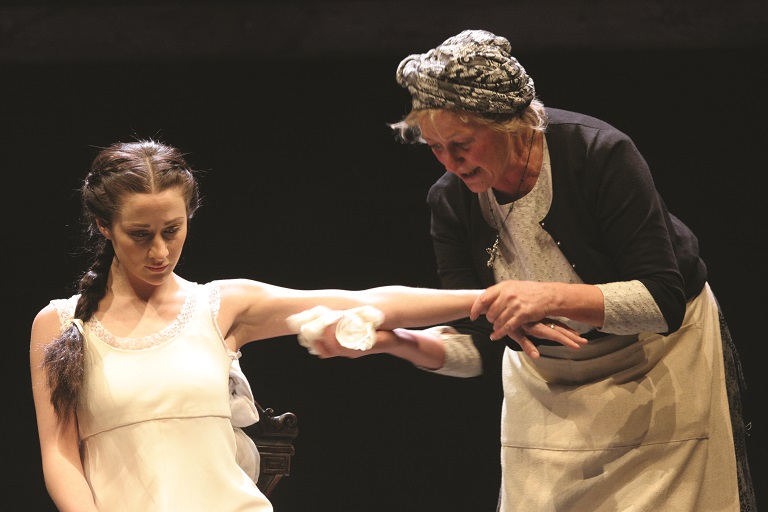Part of our series of posts that focus on a key character from exam set texts. Offering alternative interpretations and insights, these are ideal for sharing with students as they revise and prepare for their English Literature exams.
“I am the drudge and toil in your delight”
When we first meet the Nurse in Act 1 Sc 3, Lady Capulet dismisses her because she wants to ‘talk in secret’ to her daughter. However, she instantly changes her mind and calls the Nurse back. Perhaps she knows the Nurse is far more likely to influence Juliet. In context, the Nurse would have played a key role in Juliet’s upbringing, breastfeeding her in place of her mother (hence the term wet-nurse) and then remaining as her child-carer. And the nature of medieval society would have also placed the Nurse firmly in a dilemma. On the one hand, she seems to adore Juliet and wants her to be happy. On the other, her entire security depends upon her place in the Capulet household. She is often presented as a humorous and mischievous figure – a kind of naughty aunty who allows and enables Juliet to have her own way but there is more to her role, especially in terms of contextual relevance and interest.
The Nurse is trapped in the same way as Juliet is – she can’t afford to upset the Capulets and be thrown out of the household onto the streets. As an (older) servant woman with no obvious family to support her, she would face destitution; she is completely dependent on the Capulets’ goodwill. She is also at Juliet’s beck and call: upsetting ‘the prettiest babe’ (A1 Sc 3) could equally result in a fall from favour. When she meets with Romeo to arrange the marriage in Act 2 Sc 4, the Nurse admits, ‘I anger her sometimes, and tell her that Paris is ‘the properer man’. It’s clear she’s tried to discourage Juliet from her pursuit of Romeo but the word ‘anger’ suggests that Juliet is more than assertive about what she wants. The Nurse may not want to upset Juliet because she loves her but it may be because she is dependent on Juliet’s favour and has no real power over her. It’s also possible that, for once in her life, she has the opportunity to influence events and enjoys the excitement of it.
When Lord Capulet brings the wedding forward, the Nurse knows she will be playing a part in bigamy but still advises Juliet to marry Paris because her ‘first is dead or t’were as good he were’ (Act 3 Sc 5). This shows her desperation: bigamy was not to be undertaken lightly but the Nurse sees it as a better option than discovery. She is old and wise enough to understand what could happen to Juliet and to her if they admit what has happened. Juliet’s reaction is to condemn the Nurse, ‘O most wicked fiend!’ who she sees as inconsistent and fickle. But is she?
- She praises Paris – ‘a man of wax… a flower’ (Act 1 Sc 3) when he is proposed as a suitor. She is consistent about this when she reveals to Romeo that she’s angered Juliet by telling her to see Paris as the ‘properer man’.
- In Act 2 Sc 5, she stalls for many lines before telling Juliet that the wedding is arranged – as if she is reluctant to sanction it.
- She even says, ‘Well, you have made a simple choice, you know not how to choose a man: Romeo? no, not he’. She admits he is handsome but the word ‘simple’ here implies poor judgement.
- When Romeo has killed Tybalt she is surprised at Juliet’s reaction, ‘Will you speak well of him that killed your cousin?’ (Act 3 Sc 2).
- At Friar Lawrence’s cell she tells Romeo (scornfully in my view), ‘you be a man; / For Juliet’s sake, for her sake rise and stand; Why should you fall into so deep an O?’ (Act 3 Sc 3).
- Juliet claims the Nurse has ‘praised’ Romeo ‘So many thousand times’ (Act 3 Sc 5) but we do not see evidence of this in Shakespeare’s scenes. We see the Nurse seem to praise him in Act 2 Scene 5 but only by saying that he has responded like ‘an honest gentleman’ and she never completes her sentence. Is Juliet’s belief that the Nurse has heaped praise on him the wishful thinking of a young woman in love?
I think there is more to the Nurse than a busybody who misguidedly assists Juliet in her mission to marry Romeo. Juliet is a determined young woman; the Nurse is a lower class servant caught between a rock and a hard place. As the Nurse says herself, ‘I am the drudge, and toil in your delight;’ (A2, Sc 6).
Word power
The following vocabulary could form points for discussion, keywords for a lesson and useful words and phrases to use in an exam style essay:
drudge; security; dependence; dependent; humorous; mischievous; inconsistent; fickle; between a rock and hard place; dilemma; goodwill; favour; misguided; bigamy; scornful

Jill Carter is an Advanced Skills Teacher and former Leader of English and has been teaching for 23 years. Jill currently works part-time as an English teacher and GCSE Interventionist, as well as authoring for Oxford University Press.
Take a look at the RSC School Shakespeare: Romeo and Juliet. Produced in partnership with the RSC, this series helps students establish a lasting understanding and appreciation of Shakespeare’s work as a play and insights into the work as a performance.

